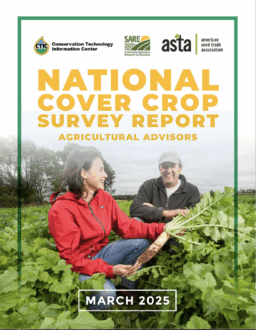CTIC, SARE and ASTA release the 2025 National Cover Crop Survey, which focuses on consultants and other trusted advisors.
More than 650 farm advisors from across the U.S. participated in a survey on cover crops, shining light on how—and how frequently—they advise growers on cover crops. A report on the survey was released today by the Conservation Technology Information Center (CTIC), USDA Sustainable Agriculture Research and Education (SARE) Program, and the American Seed Trade Association (ASTA). This is the eighth national cover crop survey conducted by those groups since 2012 and the first to focus on advisors. The American Soybean Association also contributed to this report.
"Advisors play a key role in informing farmers about cover crops and providing technical assistance to help them succeed with covers," pointed out Dr. Rob Myers at the University of Missouri, director of the University of Missouri Center for Regenerative and regional director of extension programs for North Central Region SARE. "Understanding their attitudes toward cover crops, how they get their information, and how they perceive cover crop benefits will help guide efforts to support those advisors."
Ryan Heiniger, executive director of the Conservation Technology Information Center (CTIC), added, "This survey opened a window into how cover crops fit into crop consulting businesses and other advisory services. We also observed that seeing is believing, which is borne out by the fact that approximately 70 percent of the respondents who farm themselves use cover crops on their own operations, and those cover crop users are more inclined to advise their clients on the practice."
ASTA, President and CEO, Andy LaVigne, emphasized the importance of the perspectives gained from these surveys in empowering the seed industry to respond to the needs of U.S. farmers.
“As part of the agriculture and food sector based on innovation, better understanding trends and motivations for planting cover crops enables the seed industry to improve cover crop varieties and use new technologies in the areas most impactful to American agriculture. Recognizing and adapting to the needs and desires of farmers allows the seed industry to adequately prepare, and ultimately provide, the right seed for the right farm at the right time,” he said.
The survey was conducted online in October 2024. The combination of private and public sector advisors represented 46 states. Of the 654 advisors who participated in the survey, 77% were Certified Crop Advisors (CCAs), a certification conferred by the American Society of Agronomy.
Among the highlights of the survey findings:
- The advisors who used cover crops on their own farms were five times more likely to recommend cover crops to farmers not yet using them compared to advisors who did not farm with cover crops themselves.
- Advisors using cover crops on their own farms tended to have a much higher percentage of clients using cover crops—22.3 percent of the advisors who use cover crops themselves reported 25 to 50 percent of their clients using covers, compared to 9.1 percent at the same level of adoption among clients of advisors who did not personally use cover crops.
- The farm advisors surveyed used a wide range of information sources to learn about cover crops. Advisors who reported that they learned about cover crops on-the-job rather than through formal academic or training channels preferred training sessions (63.9 percent) and webinars (57.4 percent) for learning new cover crop insights, but also liked learning from farmers one-on-one (58.3 percent) and visiting field trials (30.6 percent).
- Looking ahead, a majority of the farm advisors (56.9 percent) expected to see cover crop acreage continue to increase. They also expected farmers to continue increasing use of cover crop mixes (46.7 percent) and trying ways of combining other soil health practices with cover crops (52.9 percent). The advisors expected a moderate amount of interest in newer cover crop topics like planting green (29.2 percent), grazing cover crops (32.2 percent), and others. For more information on the CTIC/SARE/ASTA National Cover Crop Survey Report 2024-2025, visit CTIC’s website.
About the Conservation Technology Information Center
Founded in 1982, CTIC champions, promotes and provides information on technologies and sustainable agricultural systems that conserve and enhance soil, water, air and wildlife resources, and are productive and profitable. It is one of the oldest nonprofit membership organizations solely dedicated to the advancement of conservation agriculture research, policies and program delivery for producers.
